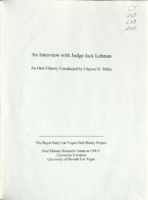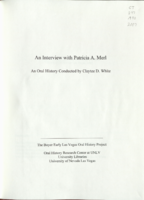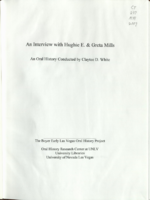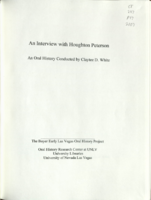Search the Special Collections and Archives Portal
Search Results

Transcript of interview with Clark Crocker by Monica Lehman, March 3, 1978
Date
Archival Collection
Description
On March 3, 1978, Monica Lehman interviewed Clark Crocker (born 1920 in Westfield, Massachusetts) about his experiences while living in Nevada. Crocker first talks about his family and educational background before describing his experiences from going to school in both California and Massachusetts. Crocker then describes what he knows about the building of Hoover Dam and later talks about his career as a teacher and school principal. The two also discuss Crocker’s hobbies and volunteer work, including that for the fire department in Pahrump, and they later discuss Crocker’s experiences as both a frogman and navigator for the United States Navy during World War II. The interview concludes with some of Crocker’s thoughts and philosophies on how curriculum should be structured in schools.
Text

Transcript of interview with Alice Doolittle by Christopher Moran, March 21, 1977
Date
Archival Collection
Description
On March 21, 1977, Christopher Moran interviewed Alice Doolittle (born 1897 in Boston, Massachusetts) about her experiences while living in Nevada. Also present during the interview is Ruth Belding, Alice’s daughter. Doolittle first talks about her reasons for coming to Las Vegas and her eventual occupation as a dental assistant. She also talks about her family’s history of living on the Stewart Ranch and the ranch’s swimming pool that attracted many during the summers of Las Vegas. Doolittle also describes her move to Boulder City with her husband, the first theaters in Las Vegas, and the Union Pacific Railroad. At the end of the interview, the three discuss Helen Stewart, Harley Harmon, and the Doolittle Center, named after Doolittle’s late husband, Ferris Doolittle.
Text

Transcript of interview with Wayne Earl by Diane Donovan, March 14, 1981
Date
Archival Collection
Description
On March, 14, 1981, collector Diane Donavan interviewed her neighbor, pharmacist Wayne Earl (born June 21, 1926 in St. George, Utah) at the collector’s home in Las Vegas, Nevada. This interview covers Earl’s early recollections of Nevada and his life after moving to Las Vegas in 1940. Earl also talks about World War II, McCarran Airport, Nellis Air Force Base, North Las Vegas politics, Jaycees, and the Chamber of Commerce. Additionally, Earl recalls his involvement in civic affairs, social and religious activities, including his affiliation with the Mormon Church.
Text

Irene Cepeda interview, April 24, 2019: transcript
Date
Description
Interviewed by Monserrath Hernández, Nathalie Martinez and Rodrigo Vázquez. Irene Cepeda is a woman dedicated to serving the Latinx as well as all minority groups in education in Southern Nevada. As a Las Vegas native, she grew up alongside the Latinx community here and is a proud Latina from Nicaraguan roots. She is dedicated to uplifting the Latinx community through her work with the Latino Youth Leadership Conference and college access specialist at Nevada State College. Now, as representative of District D on the Clark County School District Board of Trustees, she seeks to tackle the issues the district faces from acts of White supremacy to a lack of funding for English Language Learner families.
Text

Transcript of interview with Jack Lehman by by Claytee White, October 17, 2007
Date
Archival Collection
Description
Judge Jack Lehman is living the life we should all strive for - a wonderful family, a work ethic that has allowed him to serve others while enjoying a magnificent life and above all a great love affair with his beautiful artistic wife, Lou Lou. From Chemnitz, Germany, at the beginning of the Nazi reign to a prominent citizen of Las Vegas, Lehman lives an extraordinary Las Vegas life. Born in Germany in the late 1920s, Jack and his sister were sent to the United States in 1935 and after a series of living situations including a orphanage in New York, they were adopted by the Lehman family in Lake Arrowhead, California. As a young boy, he wanted to become a lawyer. After a degree from Berkeley, two tours of military duty, a stint in radio broadcasting, and serving as the Director of the Nevada Department of Economic Development, he entered law school at USC. Lehman's career in the legal field began at the largest law firm in the city - Lionel Sawyer and Collins - and then into private practice and on to the bench as a District Court judge appointed by Governor Richard Bryan. In February 2008, he was honored by judges and friends statewide as the founder of Nevada's Adult Criminal Drug Court Program commonly known as "drug court." Washoe County District Judge Peter Breen said it best, "The state is a much better place because of Jack. All those people came back from the abyss of addiction because of Jack."
Text

Transcript of interview with Pat Merl by Claytee White, October 9 & 28, 2008
Date
Archival Collection
Description
Patricia 'Pat' Merl plans for college did not materialized after graduation from a New Jersey high school in the late 1960s. Instead she took a receptionist job. The by the age of 19, it was her interest in dance classes that would lead her to audition to be a professional dancer for the Rockettes of Radio City Music Hall fame. Her days and weeks were filled with rigorous rehearsals and performances, but it was also an exciting time for a young and spirited girl. A side trip to Las Vegas in 1971 during her first ever vacation opened her to a new world of possibilities for a professional dancer. So without a job, she decides to remain in Las Vegas and explore the options. It became the beginning of a wide and varied career in the live entertainment industry. Pat's dancing resume includes working in many of the Las Vegas chorus lines of the 1970s, provides a flavor of what the work was like then and how it changed during the era. She includes the story of Frank Rosenthal and
Text

Transcript of interview with Daisy Lee Miller by Claytee White, March 22, 2013
Date
Archival Collection
Description
Daisy Lee Miller talks about being born and raised as an only child in Louisiana before moving to Las Vegas in her 20s. For a time, Daisy worked in the powder room at the California Club. It was while she was employed here that she realized she wanted something better, and she wanted to be a good example tor her kids. Daisy began attending the University of Nevada, Las Vegas to get her degree. Daisy is very proud of the fact that she graduated from UNLV at the same time that her daughter graduated from high school. Family has always been very important to Daisy, and she enjoyed spending time with her children while they were growing up. Sundays always found Daisy and her children at church while other leisure-time activities included trips to the lake or Mt. Charleston. While going to school, Daisy worked at the Economic Opportunity Board in the family planning program. Following graduation, Daisy began working for the Clark County School District where she rapidly advanced
Text

Transcript of interview with Hughie and Greta Mills by Claytee White, April 7, 2011
Date
Archival Collection
Description
Hughie and Greta Mills spent their childhoods in Charlestown, West Virginia. Fate would bring them together years later in New York City. They married in 1954. Both Hughie and Greta talk about achieving a better life through education and perseverance. He became an educator and she a librarian. In 1989, the couple relocated to Las Vegas, seeing the weather and retirement lifestyle here to their liking. During this interview they describe their lives, individually and as a couple, and how they embraced life and living in Las Vegas as a retired, African- American couple.
Text

Transcript of interview with Houghton Hoot Peterson by Claytee White, May 20, 2010
Date
Archival Collection
Description
Houghton Hoot Peterson played trombone in his high school band in northern Minnesota where he grew up. That same instrument would lead him to be a member of the highly regarded Air Force jazz band called Airmen of Note after enlistment. Then during a short tour at Nellis Air Force base, Hoot decided that the Las Vegas entertainment scene might have career opportunities for him. He moved to Las Vegas in 1962, an era of celebrity performers and tourists who enjoyed the crowds and nightlife. Hoot's point of view was as a musician in the band, most often a Strip relief band. But he also has tales of famous musicians and late night jam sessions. Hoot's career spanned 20 years. Eventually the Las Vegas scene for live musicians began to change. When times got tough for Hoot, he worked as a carpenter and at a music store. In this interview he discusses his fascinating past and offers advice for today's musicians.
Text

Transcript of interview with Rabbi Mendy Harlig by Barbara Tabach, October 18, 2017
Date
Archival Collection
Description
Known throughout the Las Vegas community as Rabbi Mendy, Mendy Harlig is a leader of the Chabad in Las Vegas, which was introduced to the valley in 1990 by his brother Rabbi Shea Harlig. Since his youth spent growing up in the Crown Heights section of Brooklyn, where he was surrounded by Hasidic Jews, Rabbi Mendy seemed destined to become a Chabad rabbi. During the early 1990s he often visited Las Vegas and assisted his brother at the Chabad of Southern Nevada. Then in 1997 he met and married Chaya Harlig and the couple permanently relocated to the valley to be the spiritual leaders of the Chabad of Green Valley. As their family grew, so did their importance to the Chabad movement in Las Vegas. During this interview, Rabbi Mendy touches upon the nature of Chabad teachings and observance in the so-called “Sin City” persona of Las Vegas. He also shares about his participation in the Las Vegas Metro Chaplaincy program. He particularly reflective of his active role immediately after of the horror of the October 1 mass casualty at the Route 91 country music festival and his perspectives afterwards.
Text
